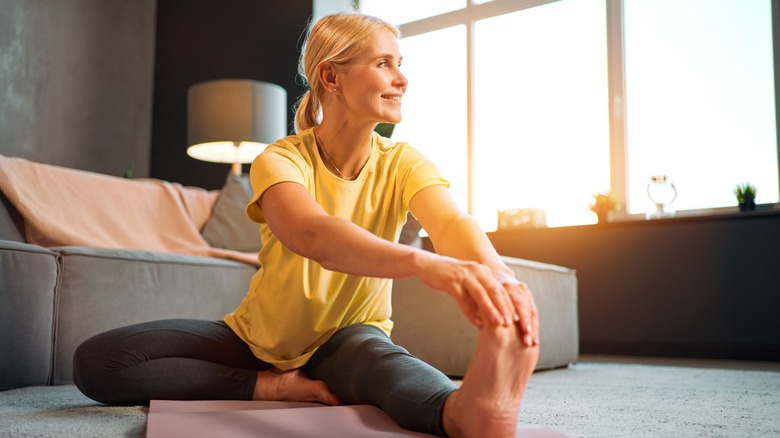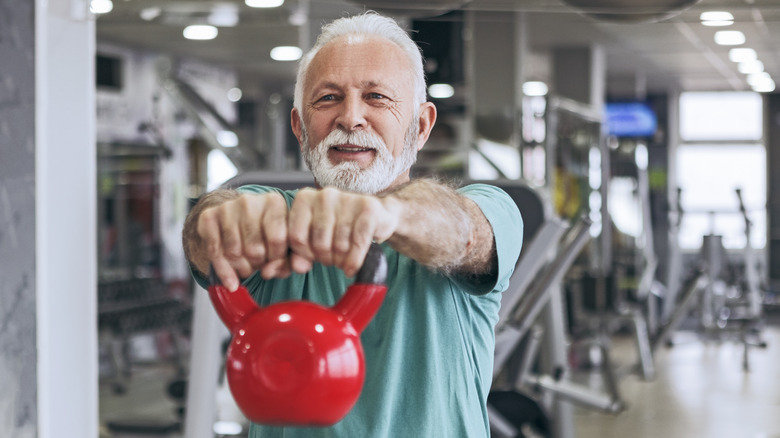When You Stop Exercising In Your 50s, This Is What Happens To Your Future Health
Exercise is often promoted as a way to lose weight or look good in a tank top, but it's no secret that regular physical activity is an important tool for great health. Getting 150 minutes of moderate exercise each week can uplift your mood, increase your energy, and improve your sleep. If strength training is part of your exercise, you'll also help build muscle, which boosts your metabolism and lowers your risk for injury.
When you're in your 50s, exercise can help you feel better years later. If you're not active, you begin to lose up to 5% of your muscle as early as your 30s, and this process speeds up with each decade. If you stop exercising at midlife, you're more likely to develop sarcopenia, which is a significant decline in muscle mass and strength in your 70s. According to a 2022 article in Trends in Endocrinology and Metabolism, people who don't exercise have a 40% higher risk of developing dementia and a 75% increased risk of cardiovascular disease. Staying active through midlife also improves your immune system and lowers your risk of early death.
Exercise supports your immune system and reduces the risk of early death
Your immune system kicks in to fight off infection and heal your body, but it begins to decline with age, called immunosenescence. A 2020 article in Nutrients found that older adults who exercise have better immune responses to reduce inflammation and risk of infection. People who have a lot of aerobic fitness have fewer aging T-cells (a type of white blood cell), which means their immune system is healthier. Exercising throughout your life prevents the aging of your T-cells. Regular exercise also improves your vaccination response to help your body fight off viruses such as the flu.
Because exercise improves your immune system, you're more likely to live longer, according to a 2015 study in JAMA Internal Medicine. The study tracked more than 200,000 people between the ages of 45 and 75 to see how often and intensely they exercised. Even just a small amount of exercise, up to 149 minutes a week, can lower your risk of death from any cause by 34%. The more exercise, the better. Those who exercised between 150 to 299 minutes a week had a reduction in the risk of early death of 47% compared to people who never exercised.
It's not too late to exercise
Even if you've never seen the inside of a gym, you can start exercising over 50 to improve your health in later years. A 2024 article in PLoS One looked at the activity levels and the physical health of more than 11,000 older women. Women who had engaged each week in 150 minutes of moderate exercise (or 75 minutes of vigorous exercise) for at least 15 years had a better physical quality of life than people who never exercised. What's notable is that women who began exercising in their mid-50s had similar measures in their health-related quality of life.
Getting in your recommended 150 minutes doesn't necessarily mean signing up for a marathon or joining a gym. Anyone can start moving by strapping on a pair of walking shoes and heading for a 30-minute brisk walk around your neighborhood (provided it's a safe neighborhood). Once you get into the habit of exercising five days a week, you can swap some of those days for some circuit training. Start with 30 seconds of jumping jacks, then move to some body weight squats (or box squats) for another 30 seconds. Continue to another cardio move, such as high knees or jump rope, then try 30 seconds of kneeling push-ups. Work between the cardio and bodyweight exercises to design your own workout at home.


